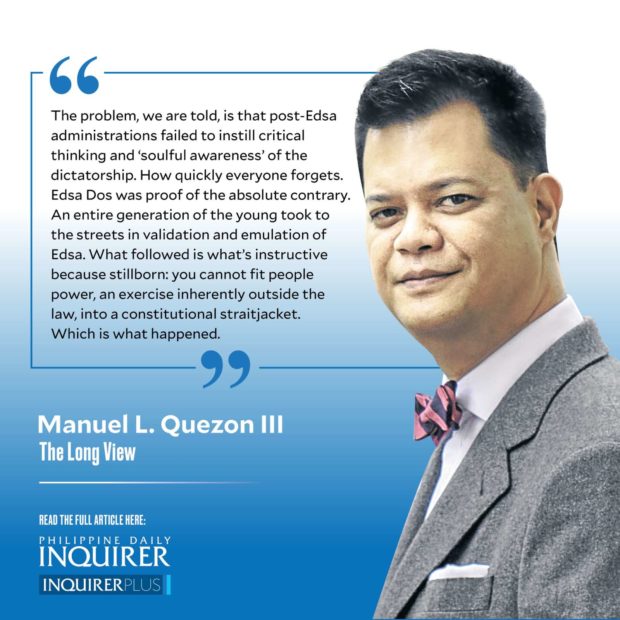Why the many matter less than the few
Here is the danger: In a republic where the rule of the minority, and not the majority, prevails, the path for those discredited in 1986, to achieve not just rehabilitation, but restoration, by 2022, is wide open. This early in the campaign, it’s not an inevitability — yet.
The problem, we are told, is that post-Edsa administrations failed to instill critical thinking and “soulful awareness” of the dictatorship.
How quickly everyone forgets. Edsa Dos was proof of the absolute contrary. An entire generation of the young took to the streets in validation and emulation of Edsa. What followed is what’s instructive because stillborn: you cannot fit people power, an exercise inherently outside the law, into a constitutional straitjacket. Which is what happened.
The logical outcome of Edsa Dos should actually have been a revolutionary government and the sweeping aside of the institutions that had failed the moment impeachment led to the streets and the armed forces, blessed by the Church, shifted the balance of power.
This is what made foreign observers uneasy and it led to the twin phenomena of the urban insurrection known as Edsa Tres in 2001, and the State of Emergency of 2006. People power ended and gave way to a consensus to endure Mrs. Arroyo rather than risk further adventurism in the streets.
For 20 years whether we like it or not, we’ve lived in dead-end times, because the system itself is impossible to change. The path to refreshing our operating system, the Constitution, through people’s initiative and referendum was closed due to a combination of factors. Taking to the streets at the behest of Cory Aquino and Cardinal Sin was understood at the time to be calls to give the then-new Constitution a fighting chance to prove its relevance. But it began a process that closed off institutional paths to Charter change. Even without the two, our leaders from all sides have lacked the courage to attempt a constitutional convention as well as public support because what interests the political class, unicameral parliamentarism, is unattractive to a public that does not want to lose its power to choose presidents and a senate which, for all the flaws of its membership, is still the best training ground for the presidency and the main venue for a national approach to national problems. Without public support, administrations cannot risk a constitutional crisis by forcing through Charter change in Congress, not least because the Constitution was mangled in such a way as to make that process problematic, as any senator will tell you. The military, for its part, has outgrown the decades of political adventurism. Even the Supreme Court is not immune to occasional fits of clarity and statesmanship.
But a country that cannot find a path to updating or simply modifying its basic law is a country condemned to institutional stagnation and irrelevance. That irrelevance has long been shown by the economic refugees we hail as heroes: OFWs. For those left behind, whatever change that is attempted has proven either too little too late or too painful and inconvenient to be tolerated by those who already have something to continue; furthermore, out of the impossibility of changing the system has sprung a committed minority never reconciled to Edsa and its verdict, who are energized in seeking other means to destroy the democratic system from within.
Administrations are elected to govern. All have, to one extent or the other, proposed policies and pitched plans to be able to govern more effectively. Where they have succeeded is when these policies and plans are done within the ambit of legislation — and here the catalog ranges from the Local Government Code to VAT to reproductive health and K-to-12, with this last law going to the heart of the matter. It is in school that the arena for instilling critical thinking and “soulful awareness” can be found and should be fought.
We have an educational system in which the state actively interferes by requiring specific classes which in turn eats into the overall time and resources devoted to education. Rizal is one example long proven to be observed in the breach in many Catholic schools and be pointless in the case of most other institutions of higher learning. The Constitution is taught in its own subject but the teaching of it, survey after survey has shown, has resulted in little knowledge of it. The purging of the General Education curriculum, on the other hand, accompanied by media’s banishing of current affairs program to the ghetto of cable, has led to the atrophy of our collective civic sense over the past 20 or more years.





















